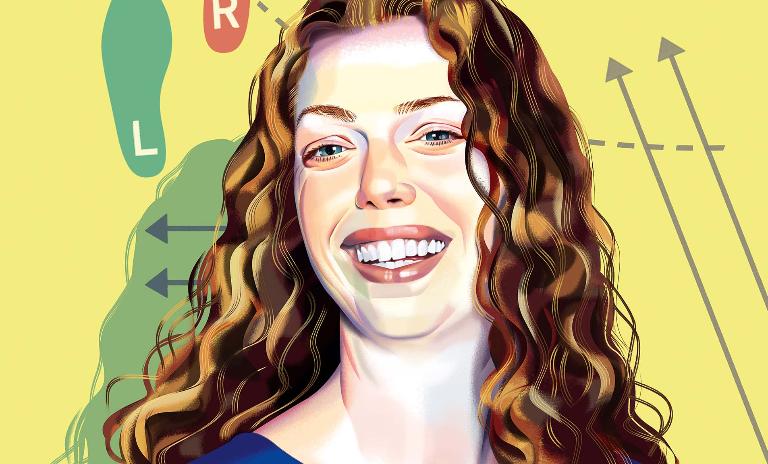Geopolitics 2.0
![{[downloads[language].preview]}](https://www.rolandberger.com/publications/publication_image/TA36_cover_EN_download_preview.jpg)
As organizations navigate shifting geopolitical tectonic plates, Think:Act magazine shows you how to mitigate global risks and stay on track.



Change is hard. If you want to build a new skill or healthier habits, everyday challenges can threaten our best intentions. Behavioral economist Katy Milkman shares some insights into how we can better set ourselves up for success.
All of us have been through the same experience in different contexts: We make a resolution and start pursuing it wholeheartedly. A few weeks down the line, enthusiasm wanes and within no time, we abandon our goal. Despite our rational selves telling us that we need to change, something invariably gets in the way. It affects our health, our finances, educational pursuits – you name it.
Behavioral economist Katy Milkman has been fascinated with the subject of why humans self-sabotage their change efforts despite their best intentions. For years, the Wharton economist has studied the idiosyncrasies of the mind and come up with a set of practical tools we can use to convince our wayward selves to do what's best for us. Her book, How to Change: The Science of Getting From Where You Are to Where You Want to Be, breaks down the strategies we can use to better stick to our efforts.
In a conversation with Think:Act, Milkman, whose work has been used by Google, the US Department of Defense, 24-Hour Fitness, Walmart and recently by the White House with advice on how to convince people to get the Covid-19 vaccine, walks us through her work and how we can apply it to our lives.

We know what's good for us and why we need to change. Yet change continues to be very difficult. Why?
Katy Milkman is a professor at the Wharton School of the University of Pennsylvania and holds an appointment at Penn's Perelman School of Medicine. She is the former president of the Society for Judgment and Decision Making and, in 2021, ranked in the Thinkers50 and received the list's Strategy Award.
The first [common barrier] is finding the motivation to begin. The second is impulsivity, the tendency to focus on instant gratification rather than long-term rewards. The next one is procrastination, the flip side of impulsivity. Forgetfulness can be a real barrier – people undervalue reminders, that they'll need some trigger to follow through. Then laziness: It's a very negative word, but we tend to look for the path of least resistance, something we share with the best algorithms. [Then there's] confidence and conformity: If we lack the confidence to believe that we have a shot at making a change, we may not ever take action [just as we] look to others for evidence of what's possible and to shape our beliefs about what we're capable of. If you deploy a one-size-fits-all solution, you tend not to be nearly as successful as if you actually understand and diagnose what is standing in your way.
Should we calibrate our behavior change goals in some way, strive for something smaller instead of a big goal?
One of my favorite studies on this was done in partnership with a large nonprofit that asked its volunteers to commit to 200 hours of volunteer work per year. They sent out biweekly reminders: "We want to make sure you keep volunteering, that you're making time for us." What we experimentally varied was [breaking] down the 200-hour yearly goal into smaller component parts, so some of the reminders said, "Remember this means four hours a week," or, "This means eight hours every two weeks," to be a little bit more flexible. We found overall a roughly 10% increase in volunteering time when we broke that big goal down into smaller component parts.
_video_none.png)
Why do we overweigh things that will happen immediately and underweigh the long-term consequences of our actions?
This is what economists call present bias. If you're choosing between pizza and salad for lunch, you think, "Oh, the pizza sounds so delicious." You undervalue the long-term goal of staying fit and healthy. The same decision might apply to savings. You get a bonus and get excited about celebrating right now and going out for a nice meal or buying a nifty new gadget instead of setting that money aside for a rainy day. Why present bias happens is difficult to answer without insight into human evolution. Maybe thousands of years ago it would have been extremely adaptive in a world where you're constantly facing survival risks and you might not have a long-term time horizon to work with. But it doesn't seem to be advantageous in today's world. [But there are] tools for how we can overcome present bias and achieve some of our long-term goals more successfully.
I did some research on a strategy I call temptation bundling. Imagine only allowing yourself to pick up a favorite treat when you're heading to the library to hit the books – we can link temptations with something that otherwise wouldn't be that enjoyable. A critical insight about how to overcome present bias is to lean into it: recognize it in yourself and recognize that instant gratification matters tremendously if you want to persist at something.
"In some situations, you can structure choices so the path of least resistance is actually the one that gets you to the best outcome."
You've talked about our 'want self' and our 'should self'. What does that mean?
We have these different perspectives and agendas, depending on the time frame of a choice. One way of thinking about that is thinking that we have two selves that are dueling: A 'want self' that focuses on instant gratification and prefers all of those things that give us immediate pleasures, and a 'should self' that focuses on long-term objectives. If they're in conflict, you can think about what would be the things that might tip the balance in favor of the 'should self' winning those battles.
You talk about the power of 'fresh starts.' Psychologically speaking, what do fresh starts do to us?
New Year's resolutions [are] one moment when we're particularly motivated to pursue goals. But the phenomenon of moments when we feel like we have a fresh start and are extra motivated arise whenever we feel like we're turning a page in our lives and have a sense of a new beginning: the start of a new week, a new month or birthdays give us the sense that we can set aside past failures. They were the failures of someone else. This leads people to be more likely to visit the gym at the start of these new periods or following fresh start dates. And this is true [also of] finances and educational goals. In one study we see a 20-30% increase in retirement savings when we invite someone to save after an upcoming birthday or after the start of spring, rather than just inviting them to save in an equally distant point in time.
Can our tendency to default to the path of least resistance be flipped to make it work for us in a more positive way?
In some situations, you can structure choices so the path of least resistance is actually the one that gets you to the best outcome. About 20 years ago, a company wanted to get more employees enrolled in their retirement savings program. To enroll, you checked a box on your first day and said, "Yes, I'd like to have a portion of every paycheck sent to this retirement savings account." They changed the paperwork so that on your first day you actually had to check a box to opt out. What happened if you took no action whatsoever, was you started saving: a 40% increase in savings ensued.
Treat change like a game you're playing against an opponent – yourself. A tailored attack will always beat a one-size-fits-all approach, but the obstacles to change can shift over time and you may need to adjust your strategy as you go.
[Another study] I love was done at the Penn Medicine Nudge Unit, where doctors were prescribing brand name drugs at too high of a rate. Doctors agreed it's not what they wanted to do, but they remember the brand name and they type it in when they were putting together a prescription. So the default was changed: Unless you checked a box that said, "Please send the prescription to the pharmacy exactly as I typed it in," the prescription was automatically sent in generic form. This led to this huge increase in generic prescribing, which everyone hails as a huge success because it reduced costs for both insurers and patients and also increased compliance with these lifesaving medications.
We can change our default settings to make the path of least resistance the one we want to take as opposed to the one that's happened to be selected for us: changing the kinds of foods that are in your refrigerator and pantry; changing your default browser from, say, social media, to a landing page that may help you achieve your long-term goals.
You have compared managing change to managing a chronic disease. Why work with that analogy?
I was talking to Kevin [Volpp, a behavioral economist leading the Center for Health Incentives and Behavioral Economics at the University of Pennsylvania] about some research that really disappointed me. Angela Duckworth [author of Grit] and I partnered with 24-Hour Fitness, a national chain of gyms. We'd offered programming that lasted for a month with the goal of kick-starting lasting exercise habits. After the program, change by and large fell off and mostly reverted to past patterns.
Kevin said: "I don't understand why we think behavior change will always endure after we take away whatever is working." When we diagnose someone with diabetes, we don't put them on insulin for a month, then take them off and expect them to be cured. We treat it as a chronic condition. He asked, "Why do you think behavior change would be any different?" That insight for me was so powerful. It changed the way I do research and think about coaching and changing behavior and encouraging others to change. To the extent that we have sustained challenges and want to create sustained behavior change, we should have sustained solutions.

![{[downloads[language].preview]}](https://www.rolandberger.com/publications/publication_image/TA36_cover_EN_download_preview.jpg)
As organizations navigate shifting geopolitical tectonic plates, Think:Act magazine shows you how to mitigate global risks and stay on track.
